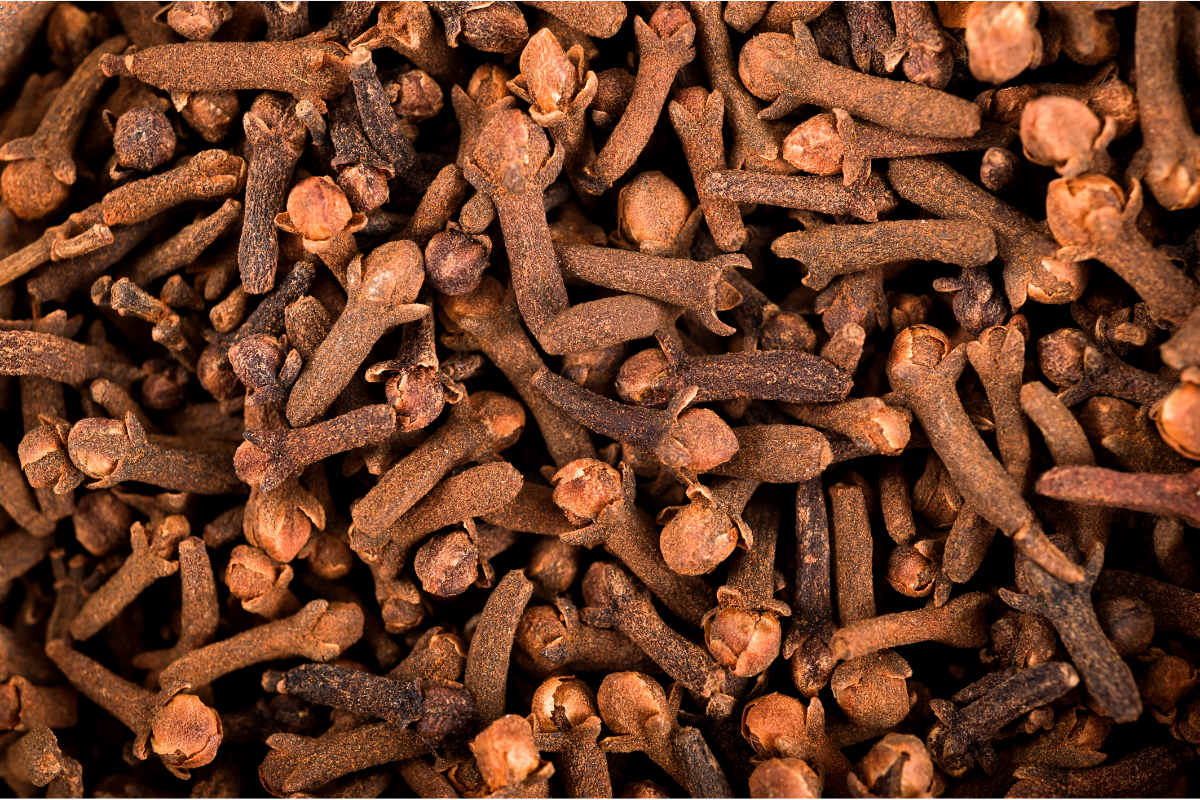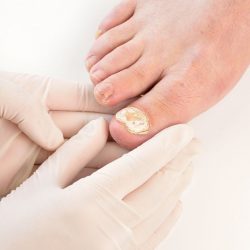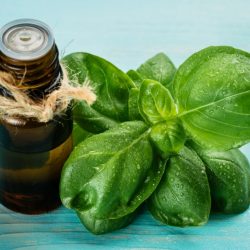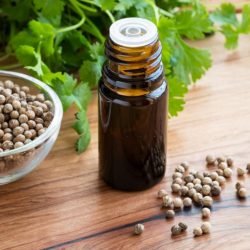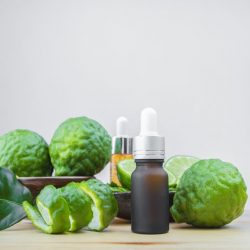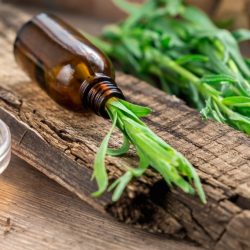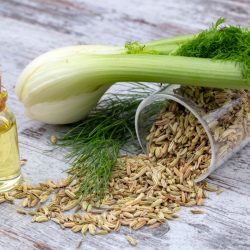The clove tree, whose botanical name is Eugenia caryophyllus, belongs to the Myrtaceae family. Its essential oil is obtained by distilling the air-dried flower buds known as “cloves”, and the pedicels known as “claws”.
History of Clove
Grown for a long time on the Moluccan islands, the clove tree is part of Ayurvedic medicine (1500 BC). Asians know cloves as“ôn ty vi“, meaning that it soothes stomach aches, nausea and diarrhoea. This world-famous spice has always been used to treat tooth decay, mouth infections and to fill hollow teeth. Today, the essential oil is used in pharmacy, food processing and perfumery.
The clove is an unopened flower bud, known in Indian Vedic medicine (1500 BC) and in Chinese medicine since 2 centuries BC.
Its origins
Charred kitchen utensils containing cloves have been found in Syria, dating back to around 1700 BC. Evidence of their use in Ayurvedic medicine is almost as old. Pliny the Elder refers to a pepper-like spice called garyophyllon, traded for its fragrance.
The fruit of a tree endemic to the Moluccan archipelago in Indonesia, cloves began their career in Ayurvedic medicine over 3,500 years ago. Strangely enough, the Chinese, who were geographically close by, had not yet got hold of it. More curiously, cloves were found in Egypt at a fairly similar time: necklaces of cloves have been discovered in the company of mummies. The ancient Egyptians believed that such necklaces warded off spells. Sound familiar? Wandering around with a small box filled with various spices and herbs hanging around your neck played more or less the same role in eighteenth-century France. In Northern Europe, we find a similar practice: an apple, then an orange, studded with cloves, as protection against the plague, another form of spell…
Cloves did not penetrate the Middle Kingdom until late, around the 3rd century BC. In those days, the emperor’s courtiers would indulge in a curious custom: to keep a few cloves in their mouths, reputed to prevent bad breath, so that his majesty’s subjects did not bother him!
Arabo-Persian medicine claims that it has beneficial effects on “urinary incontinence and difficulty in urinating due to the cold”. Taken with whey, it stimulates coitus. It perfumes the breath, strengthens the gums, stomach and liver, and calms vomiting. Taken as an eyewash, it strengthens eyesight.
Use in the Middle Ages
Later, in the fourth century AD, the Arabs brought cloves to Western Europe. But it wasn’t until the Middle Ages that spice merchants made their fortune by providing rich medieval tables with cinnamon, pepper, cloves and precious ginger. All these oriental flavours had a profound influence on the art of medieval cooking, so much so that there are countless recipes containing one or more of these spices. Cloves were not only used in the kitchen, but also in apothecaries. Hildegarde de Bingen had already mentioned its use.
Subsequently, it was attributed various properties, including relieving pain, healing wounds, strengthening the stomach and preventing the plague. But the growing interest in cloves was still in its infancy.
The clove trade
The first mention of cloves in Europe dates back to the 4th century, when Emperor Constantine I made a gift of cloves to Saint Sylvester, then Bishop of Rome. In the 18th century, Pierre Poivre smuggled clove trees to Mauritius. It was through the use of small cuttings taken from Mauritius that the French, around 1769, introduced crops first to French Guiana (1793) and then to Zanzibar.
Cloves were traded for a long time (from the ports of Venice and Genoa to the Moluccas), but this trade was interrupted by the Portuguese invaders. The Portuguese then had a monopoly on the market for this spice.
The Dutch, in turn, invaded the Moluccas around 1605, driving out the Portuguese. To obtain this commercial monopoly, the Dutch also destroyed many clove plantations. They concentrated all the cultivation on the islands of Amboine and Ternate. The trade in precious spices flourished.
In the 16th century, cloves entered a new era in their history: no less than Fioravanti, Ambroise Paré and Paracelsus examined the subject, followed later by Garus, the Discalced Carmelites, Sydenham and others. Each of them came up with their own elixir, balm or cordial, all skilfully crafted recipes containing cloves…
Contemporary period
Valnet (20th century) reports that essential oil was used to disinfect the hands of surgeons, midwives and nurses, and to clean wounds and umbilical cords, as Leclerc (20th century) also reports.
This world-famous spice has always been used to treat tooth decay, mouth infections and fill hollow teeth. Today, the essential oil is used in pharmacy, food processing and perfumery.
A few decades ago, cloves were used to produce synthetic vanillin (vanilla flavouring). Today, most of the world’s production is used to make kretek cigarettes, which are consumed in Indonesia.
As is the case with cinnamon and sour orange trees, the clove tree is capable of producing essential oil in all its parts: leaves, roots, etc. The oil we are particularly interested in today is that of the clove. The oil we are particularly interested in today is extracted from the clove. But what exactly is the nail? It’s the flower of the clove tree, at a stage of development when the flower bud has not yet opened; in other words, the little ball at the end of the claw.
What are the pharmacological properties of Clove essential oil?
Known or presumed mode of action :
- Platelet anti-aggregant viaeugenol (cyclooxygenase inhibitor, inhibits prostaglandin synthesis)
- Eugenol is anticonvulsant, anti-inflammatory through inhibition of Cox-2, cancer preventive agent
- Spasmolytic by blocking calcium channels
Antimicrobial properties :
Antiviral by inhibiting the growth ofHelicobacter pylori, clove essential oil is an antibacterial oral pathogen(prevotella intermedia, in particular), dental antiseptic and dental analgesic (by inhibiting nerve conduction).
The essential oil is also a very powerful antibacterial oil with a broad spectrum of action on Gram-positive bacteria:(Staphylococcus aureus, Listeria monocytogenes), and Gram-negative bacteria:(Pseudomonas aeruginosa), often responsible for nosocomial infections, orEscherichia coli by inhibiting the biofilm of certain germs.
Bacterial biofilm inhibitors, such as Chinese cinnamon, clove, tea tree, Peruvian balsam and red thyme essential oils are more effective at eradicating Pseudomonas and Staphylococcus aureus biofilms than certain antibiotics, offering enormous potential for the discovery of alternatives or supplements to antibiotics.
Antifungal against Candida albicans, Cryptococcus neoformans andAspergillus fumigatus, clove oil has an antioxidant effect on mycotic vaginitis.
As an immunostimulant, cloves increase the number of leucocytes, thereby countering the immunosuppression induced by cyclophosphamide.
Anti-inflammatory properties :
Theeugenol contained in clove essential oil is anti-inflammatory, slowing down the formation of oedema and arthritis and reducing the inflammatory reactions caused by insect bites by inhibiting the synthesis of prostaglandins and reducing the chemotaxis of white blood cells.
Local anaesthetic and analgesic properties:
A local analgesic and painkiller, essential oil inhibits nerve conduction in particular.Eugenol has long been used as a local anaesthetic and pulp cauteriser for disinfecting dental canals after root canal removal.
Antispasmodic property:
A spasmolytic that inhibits spasms induced by acetylcholine, carbachol, histamine and nicotine, clove is, among other things, an inhibitor of the calcium channels involved in muscle contractions.
Other effects :
- General stimulant, neurotonic, cerebral stimulant, antiasthenic, aphrodisiac
- Uterine tonic in preparation for childbirth (use before, during and after)
- Digestive and intestinal stimulant, carminative, antiputrid
- Disinfectant and purifying properties to eliminate fermentation
- Parasiticide
- Protects organs damaged by carcinogenic compounds
- Slows platelet aggregation(in vitro tests)
- Repellent to flies and moths
- Active on ANS pƩ
- Glandular tonic, active on :
- Ovaries
- Pituitary gland
- Thyroid (balancing)
- Adrenal glands
- Anti-allergic by inhibiting the release of histamine by mast cells
- Antioxidant
- Hypertensive
Does Clove essential oil require any precautions for use?
- Risk of hepatotoxicity per os
- Dermocaustic in its pure state, dilution required
- For adults only
- Pure, it is irritating to mucous membranes and skin, toxic to the liver and neurotoxic in high doses; convulsive and central nervous system depressant
- Do not inhale, diffuse or use in the bath
- Do not use for more than 10 days
- Drug interactions with essential oils containing more than 10% sesquiterpenes
- Contraindicated in pregnant or breast-feeding women
- Hepatic metabolism can cause liver toxicity, so this essential oil should always be diluted and combined with other well-tolerated essential oils, in order to “cut it down” and reduce the proportion in the final blend
- Not for use on animals
- Avoid combining with anticoagulants
- Potential interactions with warfarin, so ask your pharmacist for advice
Medical literature and clinical trials:
- V. -G. de Billerbeck. Essential oils and antibiotic-resistant bacteria. Essential oils and antibiotic-resistant bacteria. Phytotherapy
- Bandara HM, Matsubara VH, Samaranayake LP. Future therapies targeted towards eliminating Candida biofilms and associated infections. Expert Rev Anti Infect Ther. 2017
- Kavanaugh, N. L., & Ribbeck, K. (2012). Selected antimicrobial essential oils eradicate Pseudomonas spp. and Staphylococcus aureus biofilms. Appl. Environ. Microbiol
- Chaieb K, Zmantar T, Ksouri R, Hajlaoui H, Mahdouani K, Abdelly C, Bakhrouf A. Antioxidant properties of the essential oil of Eugenia car. and its antifungal activity against a large number of clinical Candida species. Mycoses. 2007
- Varel VH, Miller DL. Eugenol stimulates lactate accumulation yet inhibits volatile fatty acid production and eliminates coliform bacteria in cattle and swine waste. J Appl Microbiol. 2004
- Car FR, Schmidt G, Romero AL, Sartoretto JL, Caparroz-Assef SM, Bersani-Amado CA, Cuman RK. Immunomodulatory activity of Zingiber officinale Roscoe, Salvia officinalis L. and Syzygium aromaticum L. essential oils: evidence for humor- and cell-mediated responses. J Pharm Pharmacol. 2009
- Chaieb K, Hajlaoui H, Zmantar T, Ben Kahla-Nakbi A, Rouabhia M, et al. The chemical composition and biological activity of clove essential oil, Eugenia car. (Syzigium aromaticum L. Myrtaceae) : a short review. Phytotherapy Research, 2007
- Ghelardini Car, Galeotti N, Di Cesare Mannelli L, Mazzanti G, Bartolini A. Local anaesthetic activity of beta-car. Farmaco. 2001
- Capasso R, Pinto L, Vuotto ML, Di Car G. Preventive effect of eugenol on PAF and ethanol-induced gastric mucosal damage. Fitoterapia. 2000

